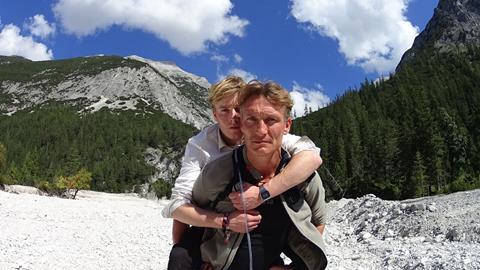A German survival thriller where the gopro cameras and the dialogue are under the control of the actors

Dir Rick Ostermann. Germany. 2018. 92 mins
A wilderness survival thriller, which flings together an estranged father and a son who is grieving the sudden death of his mother, Lysis is the product of a bold methodological experiment. Director Rick Ostermann cedes control of the lens to his actors: the film, set in a strikingly beautiful mountainous region, is shot entirely on gopro cameras as the father and son embark on an ill-advised rafting trip which soon degenerates into a struggle to stay alive. Likewise the dialogue – improvised by a set of guidelines shared on the morning of each day between the director and each actor, separately – is equally open to the vagaries of chance.
There are moments which are almost unbearably tense
Of the two, the visual aspect is more successful. With three go-pro cameras running, there is no shortage of coverage, and the actors are sufficiently clued in to keep the churning, emetic camera movement to a minimum (even so, motion-sickness prone viewers should probably steer clear). Less successful is the dialogue which, like the two men in the mountains, has a tendency to go around in circles.
With this film, director Rick Ostermann continues to explore a fascination with the kind of extreme backdrops of wild isolation which bring out in his characters a kind of Herzogian mania and desperation. Lysis follows Krieg, which used the Tyrol winterscape to show a man pushed to the brink of madness by grief. Of the two films, while Krieg was a more conventionally polished piece of filmmaking, the unusual techniques employed in Lysis might give it an added marketing hook. This novelty value should ensure further festival bookings, where it will serve as a talking point. Whether that is enough to translate into theatrical exposure is far from clear.
Oliver Masucci is Karsten, the outdoorsy dad who has chronically misjudged the bonding potential of what he views as the trip of a lifetime. Louis Hofmann is Felix, the 16-year-old son, still stubbornly wearing his funeral suit, who is not yet ready to let go of the mother who kept him apart from his father for the last ten years. Felix mopes, using his silence as a weapon against his father. And Karsten’s brittle attempts to get his son to engage take on a hectoring, aggressive tone.
There is a loose parallel here with the filming techniques used by Lars von Trier to shoot The Boss Of It All, although it should be stressed that, while von Trier was happy to relinquish control of the positioning of the camera (shots were selected at random by a computer), he kept a tight grip on the screenplay. And perhaps that’s the issue here: too many variables and a process which demands slightly too much of the actors. If, as well as improvising their dialogue, they have to be aware of the positioning of the gopro at all times, it’s a niggling distraction which keeps them from being fully immersed into the characters.
That’s not to say that the film is not effective. There are moments which are almost unbearably tense, to which the agitated camerawork only adds to the sense of genuine peril. And the peril is genuine. Actors Masucci and Hofmann really are scrambling up near vertical slopes and clinging on to the side of a mountain supported just by fingernails, faith and handfuls of grass. A gut punch of an ending evokes the bleak tragi-comedy of Gus Van Sant’s Gerry.
Production Companies: Zum Goldenen Lamm Filmproduktion/Ludwigsburg
International Sales: ARRI Media International worldsales@arri.de
Producer: Stefan Sporbert, Rüdiger Heinze, Rick Ostermann
Screenplay: Rick Osterman
Cinematography: Oliver Masucci, Louis Hofmann
Music: PC NACKT
Main cast: Oliver Masucci, Louis Hofmann























